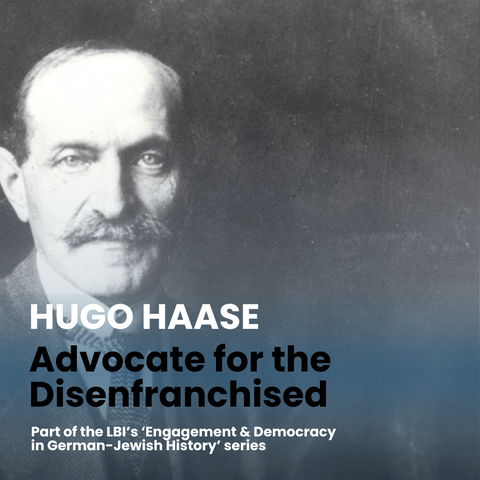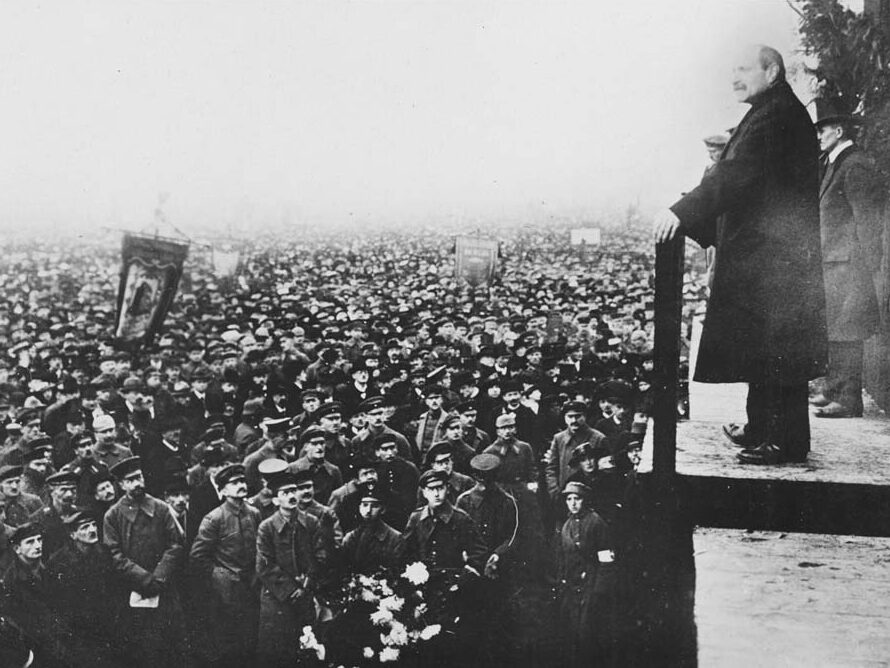
Hugo Haase. Photo: LBI
Hugo Haase, born in 1863 in Allenstein, East Prussia (today Olsztyn, Poland), was the eldest of ten children and trained as a solicitor. Though his time on the political stage was relatively brief, Haase made a lasting impression. A passionate orator and outspoken opponent of Germany’s war credits during the First World War, he became one of the most influential figures in early Weimar politics. Yet today, few remember the Social Democrat who, until his assassination in 1919, helped set major political developments in motion.
At the turn of the 20th century, German Social Democracy was more than just a political party – it was a way of life. For many working-class supporters, it offered a sense of dignity and belonging through a broad network of institutions: daily newspapers, trade unions, cooperatives, and cultural organisations. Haase was deeply embedded in this world, as historian and author Dr Karsten Krampitz explains.
Before the outbreak of war in 1914, Haase published an appeal against the conflict, rejecting the idea that Germany was acting in self-defence. Within the SPD, tensions over whether to support the war effort ran deep – and sometimes took on antisemitic undertones. Haase, who was Jewish, found himself increasingly isolated. He was first expelled from the SPD’s parliamentary group and later, despite being one of the party’s co-chairs, forced out altogether. In 1917, alongside 18 other members, he founded the Independent Social Democratic Party of Germany (USPD), breaking away from the mainstream party over its stance on the war.
Dr Karsten Krampitz is a historian, journalist, and author. A participant in the 2009 Ingeborg Bachmann Prize, he has published widely across media, including for radio and the stage. His latest book, Pogrom im Scheunenviertel: Antisemitismus in der Weimarer Republik und die Berliner Ausschreitungen 1923 (Pogrom in the Scheunenviertel: Antisemitism in the Weimar Republic and the Berlin Riots of 1923, Verbrecher Verlag), has just been released. In 2019, he produced a radio feature on Hugo Haase for Deutschlandfunk, which we revisited in this interview.
FuF: Hugo Haase seems to have been an important political figure, yet today he’s barely remembered. Who was he?
Karsten Krampitz: When he died, he was one of the most famous leaders of the workers’ movement – spoken of in the same breath as Karl Liebknecht and Rosa Luxemburg. Tens of thousands of people attended his funeral. He mattered enormously to many.
Why has he faded from public memory?
Because he never fully belonged to one camp. He symbolised the SPD’s failure in 1914, which he openly condemned. But to the Communists, he was too moderate – a ‘social pacifist’, as they called it. He was even blamed for delaying the founding of the Communist Party. So neither the SPD nor the KPD had much interest in commemorating him.
Was his most important political project the USPD?
Yes, in hindsight, the USPD (Independent Social Democratic Party of Germany) was his great achievement. At its peak, over a thousand people were joining every day. By the end, it had around 870,000 members. Germany has never seen another left-wing mass party of that scale – or one that enjoyed such electoral success. In 1920, they won 17% of the vote. No left-wing party in Germany has reached that since.
What made him stand out as a politician?
We live in a time when revolution feels like a thing of the past – the last real attempt was during the Spanish Civil War, with the anarchists. Today, meaningful change tends to come through gradual transformation, the route of social democracy. But if you compare the SPD of today with the USPD of Haase’s time, you realise: there were once different possibilities. Alternative paths the left could have taken – and Haase embodied one of them. He represents a branch of the workers’ movement that was cut short.
Where does he sit in the broader story of that movement?
When he launched the USPD, the future was still wide open. The party only split at its third congress. Things could have turned out differently. Haase didn’t die a failed man – in many ways, he was right. For him, socialism and democracy were inseparable. That idea has become lost over time. In the 19th century, it was taken for granted that universal suffrage was a core demand of the socialist movement. But with the rise of the Bolsheviks, that changed. Haase held fast to the belief that change could only happen with the backing of a democratic majority. Anything else, he thought, was just ‘putsching about’.
He seems to have been a man of integrity – and great charisma.
Absolutely. Sadly, no recordings survive, but he had a reputation as a powerful orator, even in parliament. His 1916 speech in the Reichstag, where he was heckled and abused by his own colleagues, is legendary – a piece of parliamentary history. And think about it: the SPD expelled its own co-chairman from the parliamentary group. That says a lot.

What did you find most striking about him during your research?
What really stayed with me was his warmth. For Haase, defending fellow activists – often without charging them a fee – was just something you did. That kind of solidarity is rare today. He never earned much, but that also meant he remained independent, less entangled in party machinery than someone like Friedrich Ebert. Ebert had the party’s mid-level functionaries behind him. But Haase had a human touch. After court hearings, he’d invite his clients for coffee and cake. I think I would have liked him. These days – even on the left – you mostly meet ‘political entrepreneurs’. That’s part of the problem: for many, a party career has become a path to social mobility. Haase wasn’t like that. He stayed true to himself, right to the end.
Where do you think that came from?
He came from a Jewish family and never distanced himself from his background. After the First World War, in the early days of the Weimar Republic, Germany briefly had a Jewish co-leader in government – Hugo Haase, alongside Friedrich Ebert.
Do you think his Jewish identity shaped his political outlook?
Peter Pulzer once suggested that the messianic tradition in Judaism – the yearning for justice and redemption in this world – helped explain why so many Jews were drawn to revolutionary movements in the early 20th century. In that light, communism, as a kind of successor to Christianity, promised redemption here and now. That was part of its appeal. Jews, like workers at the time, often faced exclusion and marginalisation. Haase didn’t write grand theoretical treatises, but he fought, concretely and consistently, for social equality – something that was neither legally assured nor socially accepted.
Would you call him a pragmatist or an idealist?
A pragmatic idealist, perhaps. He was accused of idealism, but what he wanted was entirely possible. His goal was for the USPD to overtake the SPD – not to splinter the left, but to return to what he saw as the SPD’s original purpose. In places like Stuttgart, Leipzig, and Berlin, the USPD was gaining ground and might well have surpassed the SPD. It could have gone another way. But in the end, the more radical forces on the left – those aligned with Moscow – won out. The Communists increasingly served Stalin’s foreign policy aims. Haase and the USPD had a different vision, and Haase stood for that alternative.
This is the first article in the series Civil Engagement and Democracy in German History: Jewish Experiences and Perspectives, first published in German as Engagement & Demokratie in der jüdisch-deutschen Geschichte by the Freunde und Förderer des Leo Baeck Instituts: https://fuf-leobaeck.de/2025/02/hugo-haase-anwalt-der-entrechteten-und-fast-vergessener-jahrhundertpolitiker/



